- Home
- Michael Chabon
Gentlemen of the Road: A Tale of Adventure Page 6
Gentlemen of the Road: A Tale of Adventure Read online
Page 6
A shrill horseman's whistle split the air, and the soldiers abandoned the violence of their grief and turned to listen to the words of a trooper who had stayed out of the fracas, a wiry, bowlegged veteran nearly as grizzled as Amram, one of those men of no great rank or bravery who by virtue of heartlessness, opportunism and a long streak of luck outlasted all their fellows and so ranked as secret commanders of their troops. When this old veteran had the ears of his comrades, he explained, with patience and regret, and with Hanukkah keeping up a whispered translation into Arabic for the benefit of Amram and Zelikman, that they must now consider their company disbanded and, each man taking a share of water and food and a horse, scatter to the winds and the mountains, like drops of mercury on a rumpled carpet. In Hanukkah's view there was merit in this suggestion, but it was so greatly outweighed by shame and ignominy that a number of Arsiyah, unable to refute the old veteran's wisdom, sat down in the shadow of the mosque and cried.
The spectacle of weeping cavalrymen seemed to have a stimulating effect on Filaq. He rose to his feet, nose wrinkled as if in disgust, fists balled at his sides, and called for the men's attention. In his thin and reedy voice, he harangued the troopers in terms that made the most hardened soldiers among them flush, while those who had been lamenting fell silent. One or two sniggered at the youth's use of a particularly vile Bulgar epithet and smiled at each other under lowered brows.
“What does he say?” Zelikman asked Hanukkah
“He says,” Hanukkah said in a whisper, “that he has a proposition to make, but it is to be heard only by men in full possession of their manhood, and not by a mob of blubbering grandmothers who would spare the Northmen the trouble of gelding them by performing that service upon themselves.”
“What proposition?”
“I can only imagine,” Hanukkah said, “having sampled his wares in that line a week ago, sitting around the fire with my fellow gentlemen of the road.”
But now that Filaq had the attention of the soldiers, he seemed to lose his nerve or his taste for handing out abuse, and wavered, blinking and swallowing, as if the thread of his own argument eluded him. Amram glanced at Hanukkah, then rubbing his chin contemplated the soldiery, who stood in the square gazing down at their bloody buskins like farmhands awaiting the lash. In one of their Western tongues Amram put a solemn question to Zelikman. Its import appeared to consist in assessing his partner's readiness for some hard business whose profit was outweighed by its impracticability. Zelikman's face expressed first grave reservation and then utter lack of interest. Amram went to Filaq and took up a place just behind and to the right of him.
“Go on,” Amram told him, in passable Khazari, giving him a gentle push. “Do it.”
Filaq pushed back, the expression on his face wondering and doubtful, reluctant and eager, returned for an instant to childishness.
“It isn't going to work,” he said.
“Probably not,” Amram agreed. “It's a terrible idea. But it seems that nobody here has a better one.”
Filaq nodded and climbed to the top step of the mosque. He ran the back of a hand across his forehead and stood looking down at the weary soldiers, searching for the words to wake them.
“Do they know who he is?” Zelikman said. “Who his father was?”
“They will now,” Hanukkah said.
So Filaq told his story, turning fine phrases in the dialect of the palaces and gardens. He asked them first to remember the fair and temperate rule of his father, the late bek, of whom, he now revealed, he was the youngest son. At this there was a murmuring among the soldiers, and one of them said that indeed Filaq resembled very strongly the late bekun, whom the soldier had seen once during the festivities attending the Feast of Tabernacles in Atil.
Next Filaq reminded them of the kindness and consideration that his late father had always shown his Muslim subjects, and above all his faithful Arsiyah mercenaries, of whom he, Filaq, had heard it said and been ready to believe that they were the very last troops in the Army of Khazaria to swear loyalty to the usurper Buljan. The Arsiyah agreed that this could not be gainsaid, and a notion of the business the youth was about to propose began to blow among the enervated and downcast soldiers like a wind through dry rushes.
“We can be at the gates of Atil in two weeks,” Filaq said. “Along the way we will surely pass through other towns, cities of the Prophet that have known defilement by the Rus. When they see your example, your loyalty to the family of my father, that great respecter of the property and the faiths of all his peoples, they will flock to our banner. By the time we reach the capital there will be thousands sworn to the cause of restoring the true heir: Alp, my good, my wise and pious brother, that strong fighter, that wolf of our ancestors, that keeper of the law common to Jews and Muslims, whom Buljan sold to the Northmen. Thousands! Ten thousand!”
“Hundreds, at least,” the old veteran said. “Possibly even dozens.”
The wind of righteous adventure that had begun to sweep through the square subsided as this secret captain and master of the accumulated lore of soldierly skepticism began to explain that any king who controlled both the treasury and the army was, in the eyes of the world, legitimate, and that while no one could know the mind of God, the Almighty had in the past shown a marked tendency, in his view, to ratify public opinion. If the Rus had treated the towns along the coast between here and Atil as harshly as they had this poor ruin, a rebellion could hope for little to feed them along the way, let alone to swell their ranks. He had just begun to describe the torments that, he understood, awaited those convicted of mutiny when, taxed apparently by lack of food and drink and the exhaustion of the past week, his eyes rolled in their sockets, and his head tipped backward, and he slid boneless to the ground, where, fortunately for him, his skull was spared fracture by the timely action of Zelikman, who caught him and eased him to the ground, concealing the pad of wadded chamois in his fist so adroitly that Hanukkah was certain no one saw it but him.
“God has silenced this man and his cowardly counsel,” Amram said in Arabic, the mother tongue of the Arsiyah. “Perhaps you would do well to heed this indication of His will.”
There was general acclaim at this suggestion, shouts and whoops and wild ululation of the steppes, but it all ceased abruptly when Filaq pumped his fist and cried: “Alp! Alp!”
There followed a silence broken only by the wind hissing in burned rafters, the derision of a crow, somewhere the smack of the sea against stone. Then to Hanukkah's mild surprise a voice rose up and, with laconic precision, likened this rumored brother Alp to a secretion on the nether parts of a she-tur
“What is your Alp to us but a galley slave?” he said.
“If he was half the man you are, boy, he would have harangued and speechified those Northmen to death weeks ago,” another said.
There was laughter at this, and the soldiers felt their spirits a little restored, and little by little the square of the burned city, with its roofless mosque and its clouds of flies and its smell of death, began to resound with cries of “Filaq! Filaq!” that died away only when their object, having turned a shade of red deeper than the flush of sunset over the western gate of the town, ran down the steps of the mosque and fled into a side street.
CHAPTER EIGHT
ON A NICENESS OF
MORAL DISCERNMENT
UNCOMMON AMONG
GENTLEMEN OF THE ROAD
They rode north through cities of carrion and widows, husk-and-stump cities where the Northmen's fires still burned. Everywhere they went—at first—male survivors of the raids fell in with the Brotherhood of the Elephant, as Filaq had dubbed them, in token of his own nickname and in bitter tribute to his dead father's fallen banner and to the creatures in whose passing lay the seeds of that fall. Some men came on horseback, bearing proper weapons, but most showed up on foot, shoeless, hungry, armed with a pruning hook or a fishing spear or the time-dulled sword of a grandfather's grandfather. Within a week of setting out for Atil, t
heir ranks were swelled—like a gangrenous leg, as Zelikman remarked—by two or three thousand beardless fools, dodderers and men crippled by anger, aimless in their aim for revenge. Creaking leather and the snorting of mules, snatches of off-key ballads, the clop of hooves and the patter of bare soles, the rattle of hayforks and lances. In the teeming camps the nailheads of the night itself were loosened, it seemed to Amram, by snoring. They ate what they found, charred wheat in the ashes of granaries, dregs and roots and small birds. Five times a day a terrible wind blew through them and bent them like grasses to the ground.
As they moved north, synagogues began to outnumber mosques, and the towns showed no sign of ill treatment by the Rus, who had stopped only long enough to sell, peaceably, the amber, furs, timber and honey they brought with them from the north. This evident discrimination against the Muslims of the southern littoral outraged the Brotherhood, for it was seen as proof of the diabolical arrangement that the usurper, Buljan, had struck with the Northmen. And indeed, Filaq, Jew though he was, found little sympathy for his cause as they drew nearer to the capital, in the heart of Jewish Khazaria, where regard was high for the conduct and merchandise if not the uncouth manners of the Rus. Though there were expressions of regret over the reports of devastation wrought by the Northmen in the south, there was no direct experience of rapine to outweigh the testimony of rich pelts and sweet honey and the finest Baltic amber, and anyway, it was said, everyone knew that southern Khazars were inveterate malcontents and, furthermore, addicted to exaggeration.
“In Baghdad during the Days of Awe this year, the Muhammadans burned Jewish prayer houses and put to the sword any who would not profess Islam,” they were informed by the babaghuq, or mayor, of Sam-bunin, a Jewish Khazar town only four days’ ride from Atil. The babaghuq had ridden out with several city dignitaries wearing fine mustaches, backed by a well-armed if small party of soldiers, to demand the immediate surrender of the mutineers and to offer them, in the event they were unprepared to oblige, a generous emolument of five wagonloads of gold in the hope that the clink of dirhams might encourage the Brotherhood of the Elephant to leave Sambunin unmolested. In closing, the babaghuq quoted a remark widely attributed in the north to Buljan, who claimed in turn to have only been transmitting the wisdom of the kagan, Zachariah, sequestered in his forbidden palace on his sacred island:
“If the great Caliph in Baghdad sees fit to permit his Jews to be burned, it would be improper for the kagan of the Khazars not to ensure that his Muslims receive the same treatment.”
That night in their camp on a point of land north of the ransomed city, the Brotherhood of the Elephant spitted five hundred sheep and feasted on fresh apples with honey and pistachio nuts, a parting gift of the city fathers. Zelikman had eaten little and smoked long and now he sat staring into a campfire, stealing frequent glances toward Filaq. The Frank's unshaved cheeks sported patchy new wisps, and his golden hair hung filthy and lank.
“This is madness,” he said at last.
“I agree,” Hanukkah said, nodding once, taking a swallow of the tart sharab the merchants of Sambunin had been kind enough to provide. He fixed his eyes gravely on Zelikman and lowered his voice and said, “What is?”
“It's no more mad than any business we've failed at in the past,” Amram said. “And maybe less. Yes, our numbers are few, if you discount the civilians—
“As you must.”
“And I do. But the fighting men are of good quality.”
“True,” Hanukkah said. “That is true, Zelikman. He has a point.”
“And they're angry,” Amram went on, “but not so blinded by the desire for revenge that they can't see how greatly to their advantage it will be if they can go against the hated Rus with the entire Khazar army at their backs, under the authority of a new bek. Furthermore—”
“You've constructed an argument,” Zelikman observed dryly
“I was inspired to do so,” Amram said, “when I observed that you were busy constructing a funk.”
“Furthermore.”
“Furthermore, I hope your head is not too far inside your dudeen to notice how lightly manned Bul-jan's left the garrison here. They're down to half their usual strength. I'm sure the man thought he was being clever, opening the south to plunder by the Rus. Pulling their attention and their long ships away from the Crimea. Suddenly all those fat Crimean cities get left open to reconquest by Khazaria. But it looks to me now as if Buljan stretched himself a little thin across the middle.”
“I imagine this is supposed to reassure me,” Zelikman said, “by suggesting that Atil will be only lightly defended. And yet all it does is worry me more about the deviousness of this Buljan. These men we've gathered around us are being led to the slaughter, my friend. And I can see no reasons for it but greed, religion and other such vanities.”
“And revenge,” Filaq said quietly
“The greatest vanity of all,” Zelikman said without looking at the stripling. “It's soldiering, Amram. I want nothing to do with soldiers, armies, chains of command. All the evil in the world derives from the actions of men acting in a mass against other masses of men.”
He gathered his cloak around him and stalked off to the edge of the camp, by the tall grass at some distance from the fire, with his face turned toward Fran-cia, a hunch in his narrow shoulders. Every so often he rose and took a few steps and muttered to himself and then sat down again.
“He is given to brooding,” Hanukkah said.
“He gives me a pain,” Amram said.
“He misses his home,” Filaq said. “Or so he told me.”
“He told you that?” Amram said, surprised. Zelikman was not a man for nostalgia or confession even under the influence of his pipe, and the scant recollections of life in Regensburg that he had offered up over the years fell well short, to say the least, of longing. “What did he say?”
“It's far, the land of the Franks,” Filaq declared and then nodded sagely, as if impressed by the breadth of his own learning. He held up his hands, palms facing each other and separated by a foot of firelight. “I have seen it in a book of maps, in the library of a gentleman my father used to take me to visit.”
At the mention of his father or the memory of that library with its precious maps, Filaq's soft voice turned raspy with emotion. Amram wondered if a boy holding a book of maps of the world felt as if he possessed the world and if Filaq now felt, remembering, that he had lost it. Filaq watched the brooding scarecrow alone at the edges of the dark, and an unwonted softness entered his strange green eyes. He was a hard boy, orphaned and imperious, but in the days since his momentary failure of nerve Filaq had shown clear signs to Amram of incipient fitness to command. He woke on his own in the dark of morning and retired having ensured that curfew was in force and universally observed. He held himself apart from the men as he had from Zelikman and Amram, sleeping in his own tent, performing his ablutions and elimination in private, riding usually at the head of the train with none beside him and none before, but he fell in regularly among the ranks, during the course of a day, all the way back to the weakest and most useless of the stragglers, to join them for a song or find shoes for the unshod. That afternoon he had made over his entire double share of the bribe to be divided among the feeblest and most miserable of the men. He rode well and looked fine on horseback, and he saw to it that those tending the animals were competent and humane. His authority was something bestowed by him on the Brotherhood and not the other way around, and Amram realized that he must himself have fallen to some degree under the spell of the boy's gift for being served by others, because in the light of his pessimism about the expedition there was no other explanation for his presence at Filaq's right hand, unless it was that in some inexplicable but deep-rooted way this pale-skinned, redheaded, foulmouthed young man reminded him of his dark-brown, sloe-eyed daughter, Dinah.
“What is it like, in Francia?” Filaq said, without taking his eyes off Zelikman.
“Cold and gray and gree
n and rank with fog,” Amram said. He had never seen Regensburg, but one winter long ago he had traveled up the Rhine in the retinue of the ambassador of Constantinople to the emperor of the West, and at times he felt that the chill of that journey was still in his bones. “The forests are vast and haunted by wolves and bears and men who take the shapes of wolves and bears. The cities of the Christians are mean and mildewed and devoid of splendor. They do not love Jews. Zelikman's family, learned men all, suffered persecution from mobs and princes alike.”
“He is a learned man himself,” Filaq said, “for a common thief.”
“A gentleman of the road,” Hanukkah said sternly, then winked at Amram and raised a dented tin dipper of wine. “Are we anything else?”
“Indeed we are not,” Amram said, raising his own battered cup.
Filaq stood and nodded to Amram. He signaled a guard and, with a tentative hand on the man's shoulder but no hesitation in his voice, gave the order that the watch should be doubled in case soldiers from the Sam-bunin garrison or an assassin sent by the babaghuq attempted treachery in the night. Then he walked through the twilight to his solitary tent, picking his way carefully through the horse dung, swinging his gawky camel hips as he went.
“A curious lad,” Amram said.
On the way to the tent, the youth was obliged to pass Zelikman. He stopped and stood watching Zelik-man watch the light die somewhere over Francia and the West, without speaking. Zelikman seemed unaware of Filaq's presence or of the presence of anyone or anything in the world but the glowing coal of his pipe. From the tall grass beyond his partner, Amram heard a dry rasp like a rough sleeve against leather, and he was already running toward Filaq when he saw an indeterminate shiver in the air, tumbling with the slowness of dice on a mat rolling toward jackpot or ruin. Zelikman sprang up and doffed his hat like a man coming in from a long day in the sun and tossed it as if aiming for a pair of antlers on a wall. Then, as the hat, which had already known such misfortune, gave its life to deflect the flight of yet another knife, Zelikman flung himself after it, onto Filaq, who had heard and seen nothing at all. The youth looked very surprised as Zelikman came down on top of him and slammed him belly first against the ground, Filaq's chin striking with a crack. Knife and hat fell to earth like a falcon tangled with the limp bundle of its prey

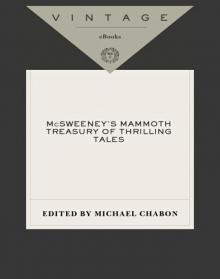 McSweeney's Mammoth Treasury of Thrilling Tales
McSweeney's Mammoth Treasury of Thrilling Tales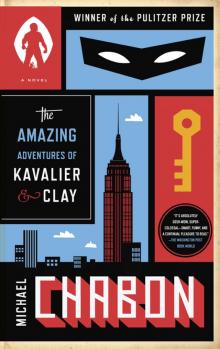 The Amazing Adventures of Kavalier & Clay
The Amazing Adventures of Kavalier & Clay The Yiddish Policemen's Union
The Yiddish Policemen's Union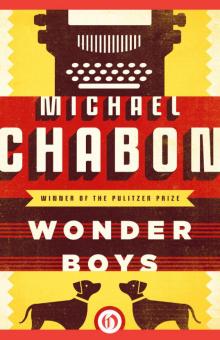 Wonder Boys
Wonder Boys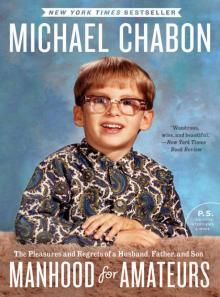 Manhood for Amateurs
Manhood for Amateurs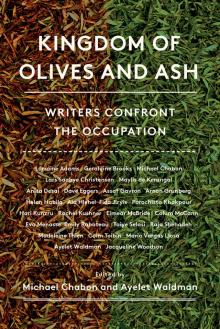 Kingdom of Olives and Ash: Writers Confront the Occupation
Kingdom of Olives and Ash: Writers Confront the Occupation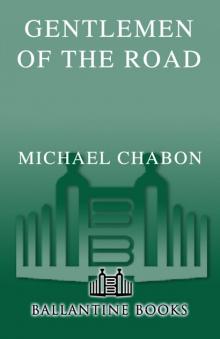 Gentlemen of the Road: A Tale of Adventure
Gentlemen of the Road: A Tale of Adventure A Model World and Other Stories
A Model World and Other Stories Pops: Fatherhood in Pieces
Pops: Fatherhood in Pieces McSweeney's Enchanted Chamber of Astonishing Stories
McSweeney's Enchanted Chamber of Astonishing Stories Summerland
Summerland Telegraph Avenue
Telegraph Avenue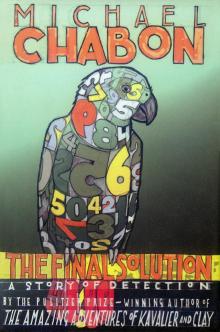 The Final Solution
The Final Solution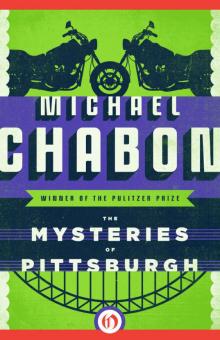 The Mysteries of Pittsburgh
The Mysteries of Pittsburgh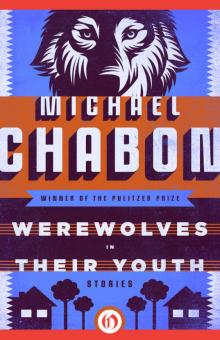 Werewolves in Their Youth
Werewolves in Their Youth Bookends
Bookends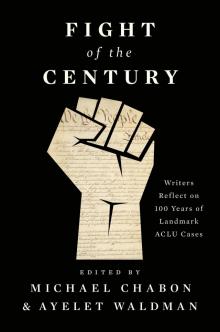 Fight of the Century
Fight of the Century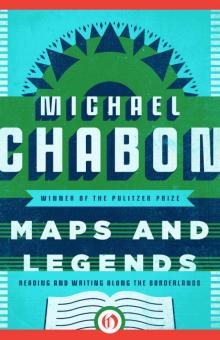 Maps and Legends
Maps and Legends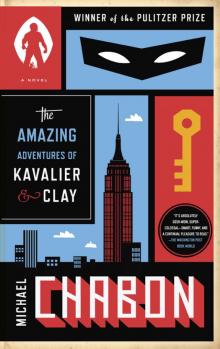 The Amazing Adventures of Kavalier & Clay (with bonus content)
The Amazing Adventures of Kavalier & Clay (with bonus content)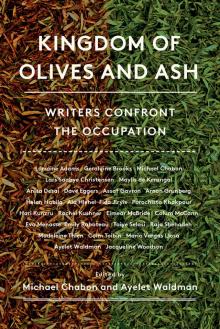 Kingdom of Olives and Ash
Kingdom of Olives and Ash Pops
Pops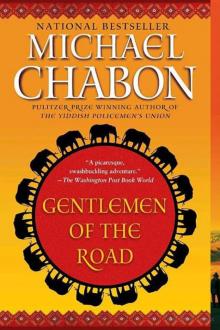 Gentlemen of the Road
Gentlemen of the Road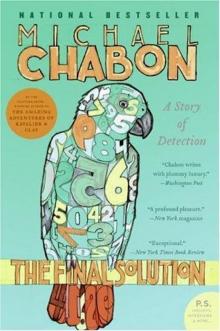 The Final Solution: A Story of Detection
The Final Solution: A Story of Detection Telegraph Avenue: A Novel
Telegraph Avenue: A Novel